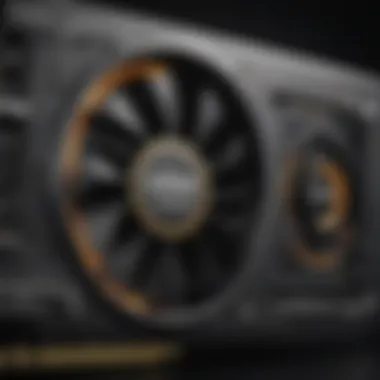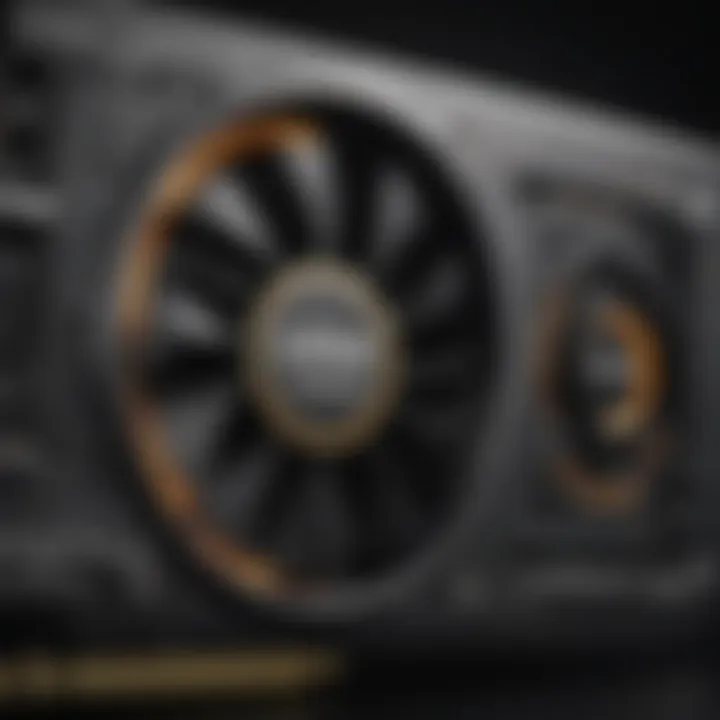Affordable Gaming Computers: Quality Within Reach


Intro
With the gaming industry booming, more players are entering the scene, eager to dive into gaming without emptying their wallets. Naturally, this has led to an increased demand for reasonably priced gaming computers. The thrill of gaming now extends beyond just those with deep pockets; quality performance is within reach for many. In this article, we will explore what sets budget-friendly gaming PCs apart. We will dig into the factors to consider when selecting your hardware, suggest some standout models, evaluate specifications, and discuss the inherent trade-offs between performance and cost.
Overview of Gaming Systems in a Budget Context
Gaming systems have changed quite a lot over recent years. A decade ago, you’d be hard-pressed to find a satisfactory machine without spending an arm and a leg. Now, it’s common to find reasonably priced gaming computers that deliver great performance. These systems can run most contemporary games at decent graphics settings while remaining affordable. The key here is not just the price; it's about finding machines that balance processing power, graphics, memory, and storage effectively, ensuring a fulfilling gaming experience.
Advancements in technology have resulted in more efficient hardware, which directly benefits budget gamers. Newer models often include powerful CPUs and GPUs that are energy-efficient. Consequently, older, powerful parts get discounted and can lead to some excellent savings. On the flip side, we also witness the emergence of innovative designs that prioritize space and performance. It’s essential to navigate this landscape consciously, adopting a strategic approach to selecting the right components or whole systems.
Criteria for Selecting Reasonably Priced Gaming Computers
When it comes to selecting budget-friendly gaming PCs, several criteria should guide the decision-making process:
- Performance: It’s crucial to strike a balance between price and performance. Look for a computer capable of running the games you love. Processor speed, GPU quality, and RAM are pivotal elements to keep an eye on.
- Upgradability: Not all systems allow for easy upgrades. A computer that can be modified in the future is a worthy investment, as technology evolves so quickly.
- Brand Reliability: Some brands are known for their reliability and customer service. It's often a good idea to opt for established names in the industry.
- Reviews and Community Feedback: Perusing platforms like Reddit can provide honest insights from other gamers who have walked the path before you.
"The best gaming rig isn't always the most expensive one. It's about what meets your needs without compromising on quality."
Whether you’re piecing together a custom computer or deciding between complete systems, always ensure that your choice aligns with your gaming preferences.
Top Picks for Budget Gaming PCs
Now that we've talked about the criteria, let’s dive into some specific models worth considering:
- Acer Nitro 50 : A solid choice for gamers on a budget. It packs a good GPU and processor combo.
- Dell G5 Gaming Desktop: This machine boasts impressive specs and comes with a reliable brand backing.
- HP Omen 30L: It offers robust performance, and the design is quite appealing, especially for casual gamers.
When selecting models, it’s wise to scrutinize their specifications in detail: the CPU, GPU, RAM, and even cooling systems are elements that will shape your gaming experience.
Evaluating Trade-offs: Performance vs. Cost
Every decision comes with its set of trade-offs. With budget systems, it's crucial to understand what you'll be giving up for a lower price tag. You might prioritize graphics performance, only to enter a scenario where processing power lags behind. Or, there could be situations where storage is limited, compelling you to manage your library carefully and possibly invest in additional external drives.
Finding that sweet spot often requires consideration of personal gaming habits. Think about the kind of games you’ll be playing and their specific requirements. Doing your homework about the trade-offs will help avoid buyer's remorse down the line.
End
The prospect of diving into gaming with a reasonably priced computer is more thrilling than daunting. With the right information and a clear understanding of personal needs and preferences, gamers can make well-informed decisions that don’t compromise quality. From evaluating performance to weighing the trade-offs between cost and capabilities, every step taken in this journey enhances not just the gaming experience itself but the overall joy of navigating this dynamic landscape.
Understanding Gaming Computers
In the realm of gaming, the phrase "gaming computer" has become not just a buzzword, but a fundamental term that encapsulates a wide array of computer systems designed to enhance the gaming experience. This section aims to lay bare what a gaming computer truly is and why it holds significant value in the quest for reasonably priced options.
A gaming computer goes beyond just any ordinary PC; it’s a finely-tuned machine that delivers superior performance, graphics, and overall gaming experience. For those trying to keep their budgets in check while not skimping on quality, understanding the facets that make a gaming computer special is crucial.
The importance of grasping what defines a gaming computer cannot be overstated. It helps gamers make informed decisions that align both with their gaming ambitions and their financial realities. It's like knowing the difference between a basic sedan and a race car; they both have wheels, but one is designed to perform under pressure.
>
"In gaming, it’s not just about playing; it’s about experiencing the world around you. This makes the choice of your computer pivotal to that experience."
When engaging with gaming computers, it is essential to consider the components that drive performance, such as the Central Processing Unit (CPU), Graphics Processing Unit (GPU), Random Access Memory (RAM), and Storage Solutions. These elements intertwine to create an environment conducive to intense gameplay and smooth performance. Let's delve deeper into these key components.
What Defines a Gaming Computer
At its core, a gaming computer is characterized by its capability to run demanding games with ease. It requires a variety of specialized components that work together harmoniously to ensure that complex graphics, physics, and processing loads do not hinder the user’s experience.
Factors like frame rates, graphical fidelity, and even sound quality play critical roles in defining what makes a computer suitable for gaming. High refresh rates and faster loading times can mean the difference between victory and defeat in competitive scenarios. Additionally, gamers often seek out computers that can be upgraded, ensuring that they can keep pace with evolving game requirements without a complete overhaul of their systems.
Key Components of Gaming PCs
As outlined, distinctly understanding the components of a gaming PC serves as a cornerstone for selecting the most suitable and reasonably priced options. Let’s break it down further:


Central Processing Unit (CPU)
The CPU is often described as the brain of the computer. In the context of gaming, it’s tasked with processing all the logical tasks and calculations that keep a game running smoothly. A powerful CPU is essential, as it dictates how many operations per second can be performed, influencing everything from how fast games start up to how they react during gameplay.
One key characteristic of gaming CPUs is their ability to handle multiple threads of information simultaneously—this parallel processing capacity is critical in modern gaming. For reasonable pricing, gamers might look towards options like the AMD Ryzen series, known for their excellent performance in relation to cost.
However, while multitasking prowess is beneficial, CPUs can heat up under heavy load. That brings us to a unique feature found in many modern CPUs—built-in cooling mechanisms. They help in maintaining the optimal functioning temperature but may limit overclocking potential unless a more robust cooling solution is implemented.
Graphics Processing Unit (GPU)
The GPU can be seen as the heart of the gaming experience. It’s responsible for rendering the graphics that players see on their screens. High-performance GPUs can transform simple code instructions into stunning visuals that make gaming immersive.
A standout feature of GPUs today is their dedicated memory, or VRAM, which allows for high-resolution textures and detailed graphics that are vital for modern games. Furthermore, brands like Nvidia and AMD offer GPUs that include real-time ray tracing capabilities, allowing for realistic lighting and shadow effects. However, with top-tier GPUs often costing a pretty penny, it’s essential for consumers to balance performance with their financial constraints.
Random Access Memory (RAM)
RAM serves as the short-term memory of the gaming computer, temporarily holding data that the CPU and GPU need to access quickly. It allows for smoother gameplay by enabling faster data transfer between these components.
Key characteristics of RAM suitable for gaming include its speed and capacity. Typical gaming systems often benefit from at least 16GB of RAM, which accommodates modern game demands. More recent advancements also see High Bandwidth Memory (HBM) making an appearance, providing improved bandwidth in a compact form. However, it tends to push costs upwards.
Storage Solutions
Storage is another cornerstone that shapes gaming experiences. The choice of storage impacts loading times, game installations, and overall system responsiveness. Gamers can generally choose between traditional Hard Disk Drives (HDD) and Solid State Drives (SSD).
The primary advantage of SSDs is their superior speed; they load games and applications significantly faster than HDDs, which can be a game-changer in competitive play. On the flip side, HDDs offer more storage space for a lower price, making them a reasonable option for gamers with diverse libraries. The latest trend sees hybrid solutions emerging, merging the speed of SSDs with the ample capacity of HDDs, fulfilling needs of gamers who require both speed and space without breaking the bank.
Market Trends in Budget Gaming
As the gaming landscape evolves, the demand for reasonably priced gaming computers has become a significant topic of discussion among consumers and industry insiders alike. This shift is fueled by various factors that not only highlight the changing preferences of gamers but also reflect broader market trends. Understanding these dynamics helps consumers make informed decisions when seeking budget-friendly options that don’t skimp on performance.
Rising Demand for Affordable Options
In recent years, the landscape of gaming has witnessed a dramatic escalation in participation. What was once considered a niche interest has blossomed into a mainstream hobby enjoyed by millions worldwide. This surge is leading consumers to seek more affordable options without sacrificing quality.
Several key elements drive this increasing demand:
- Diversity of Gamers: The advent of casual gaming, fueled by mobile devices and indie games, has attracted new demographics. These gamers often prioritize price and value over high-end specifications.
- Improved Accessibility: Online marketplaces e-commerce sites have made it easier than ever for consumers to compare prices and find deals on gaming hardware. This transparency fosters competition and encourages manufacturers to create more budget-friendly models.
- Economic Considerations: With the global economy facing uncertainties, many potential gamers are rethinking their spending habits. They want solid performance features—such as capable GPUs and sufficient RAM—without the hefty price tag.
- Community Influences: Social media forums and platforms like Reddit offer a wealth of shared experiences, recommendations, and advice from fellow gamers. This peer influence often leads individuals to explore more wallet-friendly options over high-budget alternatives.
Impact of Emerging Technologies
The landscape of gaming computers is also being reshaped by the rapid advancement of technology. As new innovations enter the market, manufacturers are challenged to keep up while maintaining affordability.
Some notable impacts include:
- Miniaturization: Modern gaming tech has benefitted from miniaturization, leading to powerful components being available in smaller, cheaper formats. Laptops that once struggled to compete with desktop counterparts have become formidable gaming machines in their own right.
- Cloud Gaming: With platforms like Nvidia GeForce Now and Google Stadia, cloud gaming is becoming a practical option for many. This shifts the focus from needing robust hardware to the quality of internet connection. For budget-conscious gamers, the allure of accessing top-tier games without investing in high-end rigs is particularly appealing.
- Energy Efficiency: Manufacturers are also focusing on creating more energy-efficient components. This not only helps keep costs down for consumers in terms of energy bills but also ensures that systems generate less heat, allowing for quieter operations and potentially extending the lifespan of hardware.
"The gaming market is in a state of flux, adapting to new technologies while continuously responding to consumer needs for affordability."
Criteria for Reasonably Priced Gaming Computers
When diving into the realm of gaming computers, it's essential to grasp the criteria that define what makes a system reasonably priced yet proficient. This understanding not only aids in navigating options but also ensures insider insights regarding performance and longevity. Gamers, both casual and serious, want machines that don't just meet their gaming needs but do so with a level of efficiency that matches their budget constraints.
There are several elements to consider when determining the value of your investment:
- Cost vs. Performance: The chief consideration often lies in obtaining the most reliable performance for your dollars spent. Many gamers fall into the trap of overemphasizing the latest specs, forgetting that sometimes older models offer near-equivalent performance at significantly reduced prices. Finding that sweet spot is critical.
- Longevity: No one wants a new gaming machine to feel outdated within a year. Ideally, a reasonably priced gaming computer should balance initial cost with how long it’ll stay relevant in terms of gaming trends and technology advancement.
- Upgrade potential: Along with longevity, the ability to upgrade is a noteworthy factor. A system that allows you to swap out components can extend its lifespan significantly. You'll want to know that should gaming requirements increase, you won’t need to replace your entire setup.
- User experience: While benchmarks and reviews are important, user experiences shed light on the real-world operation of these machines. Insight and anecdotes from fellow gamers help in understanding any quirks or benefits specific models may offer.
"The best budget PC is the one that meets your needs without emptying your pocket."
Balancing these criteria helps ensure that gamers can find a suitable setup without breaking the bank. It’s about smart investment, knowledge, and a keen eye for value.
Performance vs. Cost Analysis
Analyzing the performance versus cost dynamic is paramount for gamers on a budget. The gaming landscape is riddled with options and flashy advertising, often luring buyers into purchasing the latest products, which might not justify their steep price tags. It’s essential to sift through these offers and understand the core components that genuinely drive performance.


One way to assess this is by examining the specs directly. For instance, a low-end graphics card could take your performance down a notch when paired with a powerful CPU. This mismatch can result in what’s known as “bottlenecking,” where one component slows down the entire system. Understanding these terms helps in analyzing overall performance realistically. Moreover, tools like benchmarking websites can provide comparative insights into how a specific model performs against pricing.
Another perspective lies in evaluating refurbished or second-hand units. Often, players can find high-performing systems that may not be brand new but offer excellent performance for a fraction of the cost.
Longevity and Upgrade Potential
When gauging a gaming machine’s viability, longevity and upgrade potential are two sides of the same coin. Trends in gaming technology evolve rapidly; thus, a computer bought today may be sidelined within a year or two. It’s therefore prudent to invest in systems that can be upgraded over time.
- Component Swappability: Ensure the PC allows users to replace key parts like the GPU or add additional RAM. This capability can save gamers from future obsolete technology without shelling out for an expensive new rig.
- Future-proofing: Keeping an eye on upcoming games and their requirements is another consideration. Choosing a computer that meets the current gaming requirements while being slightly above the minimum specifications can stretch its useful life.
- User Feedback: Again, valuable insights about longevity come from the user community. Sites like Reddit or gaming forums frequently host discussions about models that could offer lasting power whilst staying budget-friendly.
In summary, discerning the criteria for reasonably priced gaming computers involves understanding the fine balance between performance and cost, while ensuring that what you buy is built to last. Invest smartly, and you’ll find a setup that could provide a gaming experience for years to come.
Top Affordable Gaming Computers
Finding the right gaming computer without draining your wallet is no small feat. This section highlights how crucial it is to explore affordable gaming options that don’t cut corners on performance and quality. Given the rapid growth in the gaming sector, numerous budget-friendly models have come to the forefront of consumer choices. Understanding what makes these systems tick provides a roadmap for gamers eager to dive into immersive experiences without a hefty price tag.
Budget constraints shouldn’t deter anyone from enjoying high-quality gaming. With careful consideration and a little research, it’s possible to snag a computer that meets or exceeds the specifications needed for various games today. The rise in technology has leveled the playing field, allowing manufacturers to produce power-packed machines at cost-effective prices.
Models Under a Specific Price Bracket
When discussing affordable gaming computers, defining a specific price bracket matters. Buyers often find themselves in a conundrum, torn between spending a little extra or sticking within their budget. Typically, models that fall into the range of $500 to $800 offer a sweet spot for gamers who want decent performance without sacrificing too much.
When scouting models, here are a few noteworthy contenders:
- Acer Aspire TC-895-UA91: It combines an Intel Core i5 processor with NVIDIA GeForce GTX 1650 for decent gaming performance at around $700, making it an appealing choice for those on a budget.
- HP Pavilion Gaming Desktop: For approximately $600, you can snag this machine equipped with an AMD Ryzen 5 processor along with a GTX 1650 GPU, ensuring smooth gameplay on most titles.
- Dell G5 Gaming Desktop: Touted for its sleek design and powerful specs, this model retails in the vicinity of $800. It features an Intel i5 CPU and RTX 2060 graphics, supporting most modern games without breaking a sweat.
Each of these models invariably caters to different gaming preferences and styles, reflecting the diverse needs in the gaming community.
Mid-range Choices for Enthusiasts
As gamers delve deeper into the hobby, aspirations to play newer titles with improved graphics might push them towards mid-range computers, typically priced between $800 and $1,200. These machines straddle the line between reasonable pricing and capable performance.
Take a look at these mid-range favorites:
- CyberPowerPC Gamer Xtreme VR Gaming PC: Retailing around $1,000, this desktop features top-notch specs including an Intel i5 processor and GTX 1660 Ti. It's particularly geared for those interested in VR gaming.
- MSI Aegis R: For about $1,200, this one hits the sweet spot for gamers looking for a well-balanced machine. With powerful graphics options and RGB lighting, it doesn’t just perform well—it looks good too.
- Lenovo Legion Tower 5: Priced close to $1,000, it houses AMD Ryzen chips with remarkable GPU options, making it a go-to for those wanting to engage in eSports and high-performance gaming without overspending.
A good mid-range gaming rig allows players to explore competitive gaming without being bogged down by constant upgrades, thus proving its worth as an investment.
Ultimately, the importance of shopping within a defined price bracket serves as a guide to sift through the noise of countless options. With a keen eye on what these affordable models deliver, gamers can secure a solid setup tailored to their needs.
In-depth Model Evaluation
When it comes to choosing gaming computers that won't send your bank account into a tailspin, evaluating the models on the market is crucial. The landscape of affordable gaming PCs is vast, with each model boasting its own strengths and weaknesses. An in-depth model evaluation offers precise insights into what you can expect from different setups. Key elements such as performance benchmarks and real user experiences play a pivotal role in this evaluation, allowing potential buyers to make savvy choices.
This section emphasizes the importance of not just looking at the price tag, but also understanding the value each gaming computer presents.
"Price is what you pay; value is what you get." - Warren Buffet
For gamers, distinguishing between bang-for-buck options and overpriced machines often requires a decision-making process that's both analytical and instinctual. By taking the time to delve deep into model evaluations, gamers can avoid pitfalls, like underperformance in critical games, while identifying models that truly deliver.
Performance Benchmarks
Understanding performance benchmarks goes beyond basic specifications. Benchmarks provide a quantitative measure of a gaming PC's capabilities under various workloads. Here's why they matter:
- Graphics Performance: Whether you're chasing high frame rates in FPS games or lush visuals in open-world RPGs, benchmarks show how well a computer can handle graphics-intensive tasks. For instance, a system equipped with an AMD Radeon RX 6600 might outperform a more expensive contender in specific titles. This analysis often reveals which components work well together and which fall short in expected graphics performance.
- Processing Power: Game performance is also governed by how well the CPU can keep up. Utilizing CPU benchmarks helps understand how quickly the machine can process information, which is vital for faster-paced gaming. If a setup is praised for its Intel Core i5's multi-threading capabilities, it's worth further exploration.
- Cooling Efficiency: Benches often reveal thermal performance, essentially how well the system handles heat under intensive loads. This is where a poorly ventilated case could hamper performance, causing thermal throttling.
Overall, digging into these benchmarks provides clarity on what you can realistically expect, helping you forge a path to gaming bliss without wasting any resources.
User Reviews and Experiences
After unveiling the hard numbers, one must not overlook the human element: user reviews. Online discussions, particularly in forums like Reddit, can provide invaluable insights. Here’s how:
- Real-World Performance: Users often report how systems perform beyond the lab tests. Perhaps the titles they spend hours playing on an HP Omen 15 gaming laptop behaved differently than benchmarks suggested. These anecdotal experiences can highlight quirks or advantages that may not come up in formal evaluations.
- Durability and Reliability: A model may have stellar specs, but if it consistently suffers from hardware failures, you’d want to know beforehand. Consumers expressing frustration over power supply issues or poorly crafted components can save you from a headache later on.
- Customer Support: Want to gauge a brand's support? Look at feedback concerning customer service. Reliable assistance adds significant value to any computer purchase.
- Community Recommendations: Tapping into the collective wisdom of fellow gamers can illuminate which machines have enduring popularity, not just fleeting hype.


In sum, combining performance benchmarks with genuine user feedback creates a robust strategy for selecting a budget-friendly gaming computer. This combination equips gamers with the necessary tools to navigate their options wisely, ensuring they get the best performance for their budget.
Building Your Own Gaming Computer
Building your own gaming computer can be a rewarding venture for those who care about control over their gaming experience. With off-the-shelf models, you often find a mixed bag of performance, and buying components individually may allow for a tailored fit specific to your gaming needs. This section explores the myriad advantages of creating a custom build and lays out the essential components you would need for the job.
Advantages of Custom Builds
The decision to build a gaming PC from scratch has several advantages:
- Tailored Performance: One of the biggest reasons to build your own PC is the level of customization. You can select components that cater to your specific gaming needs, whether it’s a high-end graphics card for demanding titles or a speedy SSD for faster load times.
- Cost-Effectiveness: Often, building your own gaming machine can save money. Retailers charge extra for the assembly, and significantly, you have the possibility to shop around for the best deals on each part.
- Easier Upgrades: When you have a hand in selecting each component, upgrading later is straightforward. Knowing what you have in your rig means you can easily identify which parts require an upgrade when new technologies hit the market.
- Learning Experience: Assembly of your computer brings knowledge as you familiarize yourself with various components and their roles. This understanding of hardware can be invaluable should you face any technical issues down the line.
- A Sense of Accomplishment: There's a sheer satisfaction that comes from seeing your custom build come to life. It's not just about having a functioning machine – it’s a personal project that can imbue pride.
Essential Components for Custom PCs
To successfully build your own gaming computer, you need to gather the right components. Here’s a closer look at what you’ll need:
- Central Processing Unit (CPU): Often dubbed the "brain" of your computer, it handles all computations. Aim for a reliable processor; models from AMD Ryzen or Intel Core series are favorites amongst gamers.
- Graphics Processing Unit (GPU): As the component that renders images for your screen, a good GPU is often the most critical part for gaming performance. Brands like NVIDIA GeForce and AMD Radeon lead the pack in this territory.
- Motherboard: This is the backbone that holds everything together, connecting all your components. Ensure it’s compatible with your CPU and GPU choices as not all motherboards will support every type of hardware.
- Random Access Memory (RAM): RAM impacts how smoothly your computer can run multiple programs. For gaming, 16GB is generally viewed as a sweet spot. Brands like Corsair and G.SKILL offer solid options.
- Storage Solutions: You will need both an SSD and possibly a larger HDD if you want a balance of speed and capacity. SSDs significantly boost load times, while HDDs are ideal for bulk storage.
- Power Supply Unit (PSU): Your PSU needs to provide adequate power for all components, as a lack of power can lead to system instability. It's advisable not to skimp on this part to ensure longevity.
- Cooling System: Depending on your component choices, you might need robust cooling. Aftermarket air coolers or liquid cooling systems are options available to manage heat effectively.
- Case: Lastly, you’ll need a case that not only fits all components but also has good airflow. Choosing the right case can contribute to aesthetic considerations as well as functionality.
Building your gaming computer can be daunting but rewarding. The process teaches you valuable skills and the joy of a rig built to your exact specifications will enhance your gaming experience.
Putting everything together does require some time and patience, but knowing that you handpicked every single part can enrich your relationship with your machine. It’s an endeavor that merges personal preference with technical capability, providing a gaming experience that can be truly unique.
Overclocking and Performance Optimization
In the quest for enhanced performance in gaming, overclocking often emerges as a powerful tool in any gamer’s arsenal. While affordable gaming computers are increasingly popular, the notion of overclocking to boost performance can transform a basic setup into a powerhouse, allowing users to experience high-end graphics and smooth gameplay without breaking the bank. It’s a matter of striking that perfect balance between what the hardware can achieve and how much a gamer is willing to push it.
Fundamentals of Overclocking
At its core, overclocking refers to the practice of running a computer component, such as the CPU or GPU, at a speed higher than its manufacturer’s specified clock rate. This effectively boosts performance, allowing the system to process tasks more quickly. But before you dive in, a few fundamentals must be grasped:
- Understanding Clock Speed: This is the rate at which the processor executes instructions. Higher clock speeds generally mean better performance.
- Cooling Solutions: When you overclock, heat becomes a major concern. Proper cooling — whether stock coolers, aftermarket air coolers, or liquid cooling systems — is essential to prevent thermal throttling or hardware damage.
- Voltage Settings: Sometimes, increasing the voltage can stabilize the overclock, but this also raises heat levels. So, it’s a slippery slope that requires careful monitoring.
Overclocking can initially seem daunting, but various software tools and online resources exist to guide users through the process. Communities, such as Reddit, are flooded with discussions, tips, and experiences that can make the journey smoother.
Risks and Rewards of Enhanced Performance
With great power comes great responsibility, and this maxim is particularly true in overclocking. Understanding the associated risks and rewards is crucial for anyone thinking about pushing their gaming rig to the limits.
Rewards:
- Improved FPS: For gamers, better frames per second can be the difference between a fluid experience and choppy visuals, especially in fast-paced titles.
- Enhanced Graphics Settings: With the extra power derived from overclocking, a gamer can bump the visuals up to higher settings, getting to fully appreciate the intricate details of their favorite games.
- Cost Efficiency: Instead of splurging on expensive hardware, overclocking allows gamers to maximize the potential of their existing components, providing a taste of premium performance at a fraction of the cost.
Risks:
- System Instability: Pushing components beyond their limits can lead to crashes or freezes during gameplay, which can be not just frustrating but game-breaking.
- Hardware Damage: Improperly overclocking can lead to permanent damage, such as burnt CPUs or GPUs. Replacing these components can quickly sap any savings achieved.
- Warranty Void: Overclocking often voids manufacturer warranties, throwing a wrench in future support should things go awry.
"The key is to push your system just enough to feel a benefit while avoiding the pitfalls of overheating and instability."
Ultimately, for gamers, the decision to overclock is an investment of time and knowledge that can yield significant rewards when executed correctly.
The Future of Budget Gaming Computers
As technology sways and dances, the realm of budget gaming computers is stepping into a transformative era. With gaming becoming an integral part of everyday life, whether for relaxation or competition, the affordability of quality gaming builds is essential. In this section, we’ll explore what lays on the horizon for budget gamers. It’s about not just accessing games, but experiencing them in their full glory without burning a hole in your wallet.
Predicted Advances in Technology
The pace of technological advancement is relentless. One can hardly miss the buzz around hardware improvements and software innovations. For those eyeing reasonably priced gaming rigs, here are a few noteworthy developments to watch for:
- Enhanced GPUs: Graphics cards are the heart of gaming visuals. With firms like NVIDIA and AMD racing to produce high-performance yet budget-friendly models, gamers can expect more bang for their buck. Future graphics cards are predicted to support ray tracing and similar technologies with more efficiency, making them affordable for the average consumer.
- AI Integration: Artificial intelligence is reshaping everything, even gaming. As games require better gaming resources, expect AI to help optimize settings dynamically based on hardware capabilities, ensuring smoother gameplay on mid-range systems. This tech can result not just in improved frames per second, but a richer experience overall.
- Streaming Services Growth: Platforms such as GeForce NOW and Xbox Cloud Gaming offer gamers access to resource-demanding games without owning high-end equipment. As these services enhance, they pave the way for budget gamers to engage with cutting-edge titles without heavy investments.
The future looks promising. Advancements like these mean that budget gaming computers can offer experiences on par with higher-end models, narrowing the gap for everyday gamers.
Shifts in Consumer Preferences
In tandem with technology, consumer preferences are also evolving. Gamers are becoming savvier, weighing options before committing to significant purchases. Understanding these shifts can provide insight into what budget gaming computers will look like in the near future.
- Value over Brand Loyalty: Many gamers show a growing demand for functionality over brand prestige. This change drives firms to offer devices that pack performance into an appealing price point, focusing on quality and specs rather than merely brand names.
- Community Feedback: Online forums and review sites are pivotal in shaping gamers’ decisions. Consumers often turn to platforms like Reddit or Facebook for guidance and to gather genuine user experiences. A product's worth can soar or plummet based on real user interactions, encouraging manufacturers to prioritize user experience.
- Environmentally Conscious Choices: There is a noticeable trend towards sustainability. More gamers are leaning towards companies that showcase eco-friendliness, which is something manufacturers will have to adapt to. This demand may drive the creation of recyclable materials or energy-efficient components in budget gaming builds.
"The evolution of consumer preferences is crucial. Understanding where the market is heading helps shape future gaming machines to cater to real needs."















